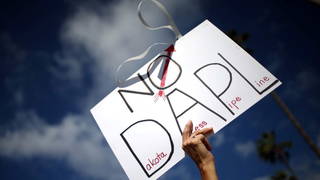
Guests
- Cornel Westprofessor emeritus at Princeton University. He’s written numerous books, including Black Prophetic Fire. He recently edited and wrote the introduction to The Radical King by Martin Luther King Jr.
Amnesty International is calling on the U.S. Justice Department to investigate the violent police crackdown against Native American water protectors and their allies fighting the $3.8 billion Dakota Access pipeline at Standing Rock in North Dakota. The call comes after Amnesty sent a delegation of human rights observers to witness the crackdown, which has included police using rubber bullets, tear gas, concussion grenades, sound cannons, water cannons in subfreezing temperatures, and other military-style weapons that have injured hundreds of people. We speak to Cornel West about why he is soon heading out to Standing Rock to show solidarity.
Transcript
AMY GOODMAN: So, you’re headed to North Dakota this weekend, which is a major weekend because December 5th is the date that the Army Corps of Engineers has set, saying that people must leave the area, although the state authorities and even the local authorities have said they are not going to move in on the land to arrest people. It’s very complicated messages that are coming out right now. Clearly, President Obama is involved with this. He visited the Standing Rock tribe in 2014.
CORNEL WEST: He sure did. Yes, he did.
AMY GOODMAN: And that’s rare for an American president to go to a reservation, so he knows this case well. He was the one to issue that unprecedented three-agency order, from Interior, Justice and Army, saying that they are—will hold off on granting the permit. But where do they stand now? They have not said they will not grant this permit.
CORNEL WEST: Well, I mean, President Obama, he specializes in symbolic gestures, because he gives pretty speeches. He’s very brilliant. He’s very charismatic. But when in terms of—when it comes time to implement and execute on the ground, oftentimes he’s—there’s a deficit there. We’ll see whether he comes through.
AMY GOODMAN: So what are you going to do there?
CORNEL WEST: I’m just going down to show my love and solidarity. I was invited by—I was honored to be invited by the elders—as you know, over 200 nations. This is the biggest coming together since the 19th century for indigenous peoples’ struggles. And I just come as a brother, as a comrade, to be in solidarity with them. And I go there and follow instructions. I want to be a force for good there in that context.
AMY GOODMAN: And after that, January, you’re going to be teaching back at Harvard? What are you going to be teaching? What are you becoming a professor of?
CORNEL WEST: I’ll teach a course as a professor of the practice of public philosophy. I mean, it’s amazing. It’s very kind of them to invite me back, I must say.
NERMEEN SHAIKH: Explain what that means, to be a professor of public philosophy.
CORNEL WEST: Well, it means simply to engage in a truth telling and an analysis of structures and institutions and try to shape souls and characters of young people in such a way that they are willing to take stands on issues that have so much to do with the destiny of both this nation and the world. But it’s a robust, uninhibited dialogue, because you’ve got conservative, centrists, liberals, radicals and so forth there. But I’ll be teaching with Roberto Unger at the law school. I’ll be at the Divinity School teaching on Du Bois. And thank God Brother Larry Bobo and Skip Gates and the others were kind enough to invite me back, as well. So, I look forward to being in the Boston area. It’s not my favorite part of the country. I’m from California. But I know you know a whole lot about that Harvard context. She’s a graduate. She’s a graduate, too.
AMY GOODMAN: In this last minute—in this last minute, Fidel Castro?
CORNEL WEST: Yeah, Brother Castro. Good God, his solidarity with struggles in Africa, with his historically—
AMY GOODMAN: Did you ever meet him?
CORNEL WEST: I never met Fidel Castro. I went to Cuba, and I went there, and I was characterized as a counterrevolutionary with a smile, because I had called for the rotation of elites. I’m a radical democrat, democratic socialist. I believe that leaders ought to rotate. So I called for the rotation of elites, and they pulled me in the palace. “What are you talking about? This is critique.” Oh, yeah, I’m critical, absolutely. But at the same time, I salute the health system. I salute the education. I saluted the fact that he stood up in the face of American imperial power, 630 assassination attempts, fought back against the Bay of Pigs and affirmed, most importantly, the greatness of the Cuban people. They suffered under Batista. And they did suffer under Castro in terms of his repression of dissenting voices. But at the same time, they now emerge powerful again. And I think it’s a magnificent history of the Cuban people. But Castro has always, for me, been a fascinating figure, heroic figure. But still, I was very critical of the repression and not rotating, not having the kind of turnover in leadership that I would have liked to see. But he’s one of the great revolutionary communists of the 20th century, and, as a revolutionary Christian, I love him.
AMY GOODMAN: Well, on that note, I want to thank you for being with us. Dr. Cornel West, professor emeritus at Princeton University, thanks so much for joining us.
CORNEL WEST: Thank you. Thank you.
AMY GOODMAN: This is Democracy Now! When we come back, we’ll look at one of the Cabinet picks of Donald Trump—education secretary—and what it means for public education in America. Stay with us.













Media Options